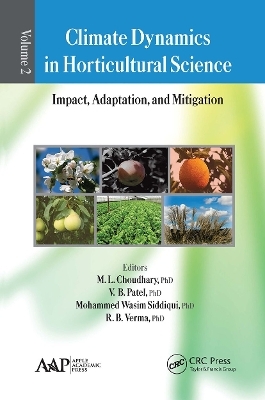
Climate Dynamics in Horticultural Science, Volume Two
Apple Academic Press Inc. (Verlag)
978-1-77463-098-3 (ISBN)
Climate change and increased climate variability in terms of rising temperatures, shifting rainfall patterns, and increasing extreme weather events, such as severe drought and devastating floods, pose a threat to the production of agricultural and horticultural crops—a threat this is expected to worsen.
Climate change is already affecting—and is likely to increase—invasive species, pests, and disease vectors, all adversely affecting agri-horticultural crop productivity. Advances in agricultural knowledge, science, and technology will be required to develop improved crop traits, such as temperature, drought, pest, and salt tolerance. This two-volume set gives readers an understanding of the issues and makes suggestions for ways to mitigate adverse climate change effects on crops.
The focus of Volume 1: The Principles and Applications in Horticultural Science is to identify impacts and suggest appropriate and effective adaptation and mitigation strategies. Volume 2: Impact, Adaptation, and Mitigation focuses on the impact of climate change on horticultural crops and offers ways to adapt practices to mitigate adverse effects. Together, the two volumes offer a diverse selection of chapters that address issues of importance to those in the horticulture industry, researchers, faculty, and others.
The two-volume set:
• Provides a recent understanding about climate change effects on horticulture
• Covers unique information regarding important fruit crops, including flowers, spices, and plantation crops
• Serves as an excellent source for researchers to formulate their adaptation and mitigation strategies
• Covers abiotic and biotic stresses in relation to climate change
• Presents environmentally safe and recent technological approaches such as nanotechnology and biodynamics
• Includes case studies
The books are an excellent resource for researchers; instructors; students in agriculture, horticulture, environmental science, and other allied subjects; and policymakers.
M. L. Choudhary, PhD, is currently vice chancellor of Bihar Agricultural University in Sabour, Bhagalpur, Bihar, India. He received a master's degree in horticulture from Banaras Hindu University, Varanasi, Utter Pradash, India, and his PhD in the USA. The government of India deputed him for an advanced study on Hi-Tech Horticulture and Precision Farming in Israel and Chile. In a career spanning 30 years, he has occupied several executive positions, including horticulture commissioner, Ministry of Agriculture, India; chairman, Coconut Development Board, Kochi (Kerala); Ministry of Agriculture, India; national project director, FAO; visiting scientist at Rutgers University, New Jersey, USA; head of the Department of Ornamental Crops, IIHR, Bangalore; and head of the Division in Floriculture at IARI, New Delhi. As horticulture commissioner of the Ministry of Agriculture, India, he conceived, conceptualized, and implemented flagship programs such as the National Horticulture Mission and the National Bamboo Mission and Micro-irrigation. Apart from his professional career, he was also chairman and member secretary of various committees constituted by the government of India as well as state governments. He has guided 18 PhD students and 21 MSc students in the field of horticulture and has published 124 book chapters, 19 books, and 109 research papers of national and international repute. Dr. Choudhary has represented India at various international forums in the capacity of chairman and member. He was also the chairman of the Codex Committee of the Scientific Committee for Organic Standard of Ministry of Commerce. He has been conferred with 15 awards from various scientific and nonscientific organizations and government committees for his outstanding contribution in the field of horticulture/floriculture. He has also been awarded the Fellowship of Horticultural Society of India. Dr. Choudhary in his 30 years of academic, research, and administrative ca
Volume 2: Impact, Adaptation, and Mitigation. Preface. Global Climate Change and Indian Horticulture. Climate Change Prediction: Uncertainties and Accuracies. Climate Change and Rainfed Horticulture. Climate Resilient Horticulture Based Agrarian Livelihood in the Eastern Region. Climate Resilient Horticulture for North Eastern India. Climatic issues Affecting Sustainable Litchi (Litchi chinensis Sonn.) Production in Eastern India. Climate Change Resilient Island Horticulture. Global Climate Change: Myth, Reality, and Mitigation. Nanotechnology, Plant Nutrition, and Climate Change. Phytopathosystem Modification in Response to Climate Change. Soil Fertility Dynamics vis-à-vis Climate Change in Citrus. Soil Solarization and Moisture Conservation Practices to Combat Climate Change. Biochar Technology for Sustainable Horticulture. Mycorrhizal Fungi in Sustainable Horticultural Production under Changing Climate Situations. Impact of Climate Change on Plant Pathogens. Quality of Fruits in the Changing Climate. Homa Therapy an Effective Tool in Mitigating Soil, Water, and Environmental Crises. Awareness about Climate Change: Perception and Action. Climate Change: Impact on Pollinators’ Biodiversity in Vegetable Crops. Climate Change Impacts on Field and Horticultural Crops with Special Reference to Bihar, Possible Adaptation Strategies and Mitigation Options. Index.
| Erscheinungsdatum | 06.04.2021 |
|---|---|
| Zusatzinfo | 11 Illustrations, black and white |
| Verlagsort | Oakville |
| Sprache | englisch |
| Maße | 152 x 229 mm |
| Gewicht | 453 g |
| Themenwelt | Technik ► Bauwesen |
| Technik ► Umwelttechnik / Biotechnologie | |
| Weitere Fachgebiete ► Land- / Forstwirtschaft / Fischerei | |
| ISBN-10 | 1-77463-098-2 / 1774630982 |
| ISBN-13 | 978-1-77463-098-3 / 9781774630983 |
| Zustand | Neuware |
| Informationen gemäß Produktsicherheitsverordnung (GPSR) | |
| Haben Sie eine Frage zum Produkt? |
aus dem Bereich


